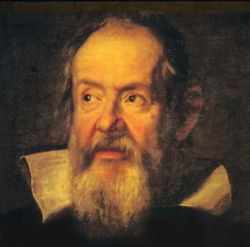Galileo Galilei- Father of Modern Science
Galileo was considered the "father of modern astronomy, physics and science" (famousscients.net) during his time period. One major advancement that Galileo is well known for is his progression of the "basic telescope" (zephyrus.co.uk), although he did not invent it himself. Aside from his use of the telescope, Galileo supported Capernicus' sun-centered universe theory. This eventually led to his sentence of "'vehemently suspected of heresy'" (hsci.cas.ou.edu). He was then forced to a public adjuration, recant of his statement. After being put on house arrest, Galileo continued his work on his writings, publishing his last book, "Discourses Concerning Two New Sciences" (bbc.co.uk).
Major contributions that Galileo discovered all include planets and space. One such observation that he made were sunspots on the sun. This allowed him to make the conclusion that the sun also revolved on an axis of its own. Again, this went against the Church and Aristotle's theory. Another great discovery by Galileo would be the four moons orbiting Jupiter. An argument against Copernicus' system was "if the moon were in orbit around the Earth and the Earth in orbit around the Sun, the Earth would leave the Moon behind as it moved around its orbit." (utk.edu). The discovery of Jupiter's moons allowed Galileo to disprove this theory, giving us the understanding today on why our moon still orbits Earth. One of Galileo's biggest contributions is that of the phases of Venus.
According to utk.edu, by observing that Venus went through phases just like our moon, he was credited with "the first conclusive observational proof that was consistent with the Copernican system but not the Ptolemaic system" (utk.edu).
According to utk.edu, by observing that Venus went through phases just like our moon, he was credited with "the first conclusive observational proof that was consistent with the Copernican system but not the Ptolemaic system" (utk.edu).

